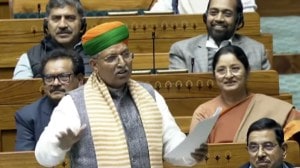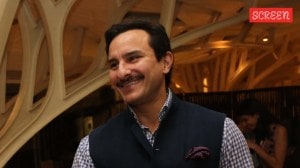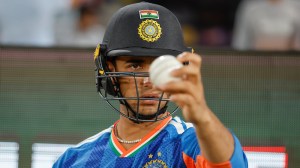8216;We don8217;t appreciate each other8230; When people ask me to quit,do you think it doesn8217;t affect me? And how often do you want me to resign?8217;
In this Idea Exchange,Delhi Police Commissioner Neeraj Kumar talks about the problems the city poses for policing,the constant media scrutiny,the "lack of appreciation" and being on trial for crimes against women. This session was moderated by Editor,Delhi,Rakesh Sinha
In this Idea Exchange,Delhi Police Commissioner Neeraj Kumar talks about the problems the city poses for policing,the constant media scrutiny,the 8220;lack of appreciation8221; and being on trial for crimes against women. This session was moderated by Editor,Delhi,Rakesh Sinha
Rakesh Sinha: Your department is being held accountable for practically every rape in the city.
I am a mere policeman,superannuating in three months from now. I am extremely proud of what I have done in the areas of counter-terrorism,organised crime,the Mumbai blast case which ended in convictions recently. I headed that Special Task Force. I got the Memons back from Karachi. I am proud of my record in economic crimes,anti-corruption cases and in field policing. I have tried my best. Having worked in all these areas,I am on trial in the area of crimes against women. I welcome it. I will welcome whatever decision the government takes with all humility.
Ritu Sarin: Have there been discussions on possible changes in the Delhi Police?
No,not yet. I am reminded of a couplet by Ghalib. I hope it is not premature to recite it: Thhi khabar garm ki Ghalib ki udenge purze. Dekhne hum bhi gaye thhe,par tamasha na hua It was widely rumoured that Ghalib would be blown to bits. I also went to witness it,but the spectacle never occurred.
Rakesh Sinha: How difficult have the last few weeks been with the clamour for your resignation?
I am least perturbed. If you search your hearts,you know that rapes are not preventable crimes: 97 per cent of rapes take place within the confines of homes. They are opportunistic crimes.
Coomi Kapoor: The Delhi Police is being accused of a lack of sensitivity in dealing with gender issues. Take the case of a policeman slapping an NGO worker in the recent rape case involving a five-year-old.
That incident was an aberration,a one-off. When did you last hear of a policeman hitting a woman? I dont want to justify that officers conduct. Whatever be the provocation,it was unpardonable and unjustifiable to hit a woman. But,if you see the video footage prior to what happened,you will notice that this girl had spat on the ACP,called him namesvery filthy namesand a stage came when he lost his balance and slapped her. It should not have happened. But he was under grave provocation.
Dilip Bobb: What are the problems that Delhi specifically poses for policing,apart from your being answerable to the Home Minister etc?
The biggest problem we face is the way the city has grown. The city has expanded at an exponential rate and the bulk of the population lives in unauthorised colonies,in jhuggi-jhopdi clusters. In some areas,the living conditions are appalling. Now,those people are exposed to the media,TV and they see a lifestyle which they aspire to. But given their social position,their literacy levels,they feel they will not be able to get close to those aspirations. So they take to crime,to juvenile delinquency. Now,being under the Chief Minister or Home Ministry is not of much consequence. If tomorrow the government decides we should be under the CM,we will work under the CM. We have nothing against the CM. But one challenging circumstance is that we are under tremendous scrutiny,most of all,media scrutiny. Recently,there was a rape in Belgaum,a gangrape. The culprits have still not been caught. Where is it in the media? Has anyone asked for the resignation of the SSP or DIG? There have been a series of rapes in Madhya Pradeshhas anyone clamoured for the resignation of the district police chief? But in Delhi,as soon as something like this happens,its said the Commissioner of Police CP must resign. This was never the case before. When Rajiv Gandhi was shot at while visiting Rajghat,was the CP asked to resign? Parliament was attacked,was the CP asked to resign? No. I have a feeling that there is a very strong lobby working against me. This is a lobby created by some people I had booked while at the CBI.
Y P Rajesh: Are you trying to say that the police should not be held accountable for its omissions and commissions?
Not for a moment. Everybody says that the highest persons should be held accountable. But why is it that in all these years when major incidents have taken place,this was never the case?
Archna Shukla: You seem to be suggesting that media scrutiny is unfortunate. From the average citizens point of view,media is bringing to the fore crimes that have gone unnoticed,they are helping the police pull up their socks.
All I said was that it is a part of the challenge we face in Delhi. The challenge of constant scrutiny. Not only by the media. There are so many commissions here. There is the NHRC,National Commission for Women,National Commission for Scheduled Castes amp; Scheduled Tribes. There is a public grievance cell. There is the Police Complaints Authority. We are answering their queries,their reports,complaints all the time. My guess is that nearly 70 per cent of complaints they have pertain to Delhi. Is it because more is going wrong in Delhi? Or is it because of their proximity to us? We welcome it. Constant scrutiny keeps us on our toes.
N P Singh: Why does Delhi score much higher on the crime graph than metros like Mumbai,Kolkata or Chennai? Is this related to the migration levels in the capital?
Firstly,I refute this hypothesis that Delhi compares badly with other cities. It was not so in my annual press conference where I gave statistics to show that we are not badly off. I wish to make a comment here. The most fundamental reform in police reforms is that appraisals of police performance should not be gauged by the number of crimes registered. So please do not go by figures. I can give figures. Post the December 16 gangrape,I gave instructions that once a woman or a girl comes to a police station,her complaint will be recorded verbatim,issues of jurisdiction will not be raised. Do you know the result? There has been a more than 158 per cent increase in the number of rape complaints registered. In molestation complaints,the increase has been 600 per cent,in eve-teasing cases 700 per centall since January. Now,at press conferences,I am told that rapes have increased,that crime is out of control. So I am being beaten with my own stick. I have tried to set a system right but those statistics are being used against me. We must not pay too much attention to statistics. We have to look at the action taken. I am very proud to tell you that about 90 per cent cases have been solved. And most of them were solved within the first week.
Prawesh Lama: After the December 16 gangrape,the protests at Vijay Chowk on the first day were unprecedented. Looking back,would you have handled the protests differently?
The protests were on a very emotive issue. We could not have come down very hard on protests the very first day. We exercised restraint. The second day,when it started again,we were in a bind because the following day,the Russian President Vladimir Putin was to visit Hyderabad House and Republic Day preparations were on. The protesters were using iron rods to attack policemen. All day we used water cannons,tear gas shells. But they would not leave. And it began to get dark. So at some point this unlawful assembly had to be dispersed.
Ananya Bhardwaj: You said that post December 16 case,the police have become strict when it comes to lodging an FIR on a womans complaint. In many cases of rape and molestation recently,the accused and the victim were found to be either couples or were in live-in relationships. Many women have lodged complaints of rape against their live-in partners when they refused to marry them. Is the law on rape,molestation being misused?
The Dowry Act,when it was enacted,saw cases registered against whole families. At some point it was realised that it was being misused. If you are in a live-in relationship,the sexual relationship you are having is of consensual nature. If the man says at some stage that I do not intend to marry you,the woman then says,ok I will register a rape case against you. Then she says she has been raped continuously for three years. A large number of cases fall within this category. There are genuine rapes too that happen within homes. These are opportunistic crimes mostly committed in a private space.
Sumegha Gulati: Women victims are more comfortable discussing their problems with female police officers. Why are there so few women police officers in the force?
The government has sanctioned 418 additional women sub-inspectors and 2,088 women constables. Only 6 per cent of the police force consists of women. We need a mahila battalion like the one CRPF has.
Arun S: Have you been able to convince the authorities on the need to increase the strength of police personnel for policing and also on the need for more CCTVs?
The government has been very responsive. Over Rs 1,000 crore is for the safe city project. Under this there will be many more CCTV cameras. Right now we have 3,000,that will go up to 5,000,but we require many more. Once the safe city project and the intelligent traffic system go through,there will be cameras everywhere. The December 16 case was solved with the help of CCTV footage that we got from a guesthouse. The Deepak Bhardwaj murder case was also solved with the help of CCTV footage. Many new police stations have also been sanctioned.
Sanjana Sharma Saint Marks School,Janakpuri: As a student I have to travel to school and coaching classes. What steps should I follow to ensure my own safety?
I would say to you what I tell my daughters: make sure you are escorted. After dark do not go into areas where there is the likelihood of any harm coming to you. Take all precautions that any girl should take in any city of the world.
Anurag Watts St Marks School,Janakpuri: Do you think that media is biased against the Delhi Police? Only its failures are brought to light.
This has been a very sore point with me,emotionally. I have been called here to Idea Exchange because of the controversial incidents that have happened; I wish you had called me when we cracked the Pune blast cases. The maximum number of Indian Mujahideen modules were busted by the Delhi Police. We solved the Defence Colony bank heist,arrested everybody within no time,but there was no appreciation. The December 16 gangrape was cracked in no time but there was no mention of the fact that the police had solved it. Even in the Deepak Bhardwaj case no one appreciated us.
If the Pentagon was attacked by terrorists in Washington and the police had cracked the case within 72 hours like the Delhi Police did,what would have happened in the US? The then president,Mr Bush, would have called all the police officers to the White House and felicitated them in public. More recently,in the Newtown incident,where 26 schoolchildren were killed in cold blood,President Barack Obama went there and the first people he met were the first responders,the paramedics,ambulances,the police etcnot the bereaved families. We have forgotten to appreciate each other. The Mumbai bomb blast case ended in conviction in the Supreme Court,did any one of you take notice of it or try to find out who were the people behind it? Its not just the media,I did not get even a signal from my own department,the CBI,appreciating the success. We do not appreciate each other,we do not boost the morale of each other and that is why we are the country we are. You can keep bashing a dead horse but how much will you bash? And then you expect the police to crack cases.
Its about a culture. After the Newtown incident,they talked about gun laws. They didnt say,sack the commissioner. After the Boston Marathon was bombed,did you hear people blaming each other? Their response is that there is a common enemy and lets go after that enemy. In the Boston case,they shot dead a terrorist. They closed the entire city for three days. People were not allowed to step out of their homes. Can you imagine a situation like that in India? Its impossible. When people ask me to resign,do you think it doesnt affect me? More than me it affects my family. And how many times do you want me to resign? If my resigning would stop rapes of children,brutalisation of women,domestic violence,I will resign a 1,000 times. This is not a response from a mature society.
Geeta Gupta: The two cases that we have been dealing with the December 16 gangrape and the five-year-old girls rapecould have been prevented if the police had been policing. On December 16,the bus was roaming around the city,it jumped red lights. The five-year-old girls parents had lodged a complaint but nothing happened.
Stand with me on the route of that bus. Standing there,it is difficult to tell what is happening inside each vehicle. Theoretically,the gangrape was preventable. But none of the accused had a criminal record. And how would the police know that this would happen,that those men intended to pick up a girl at that time? Was there an SOS from the vehicle? Did the cars behind and alongside notice anything amiss inside the bus? The answer is no. Hypothetically,the police should have known,but it is not practical.
In the case of the five-year-old girl,the victim used to come down to be with the accused,Manoj,every day,watching TV in his room. However,on the day she went missing,her parents did not even once express any suspicion of him. Had they said anything,the police would have broken the lock to his room. The point is that until the parents do not express suspicions about someone,we cannot go breaking locks.
Apurva: Earlier you said the most important reform is mass registration of cases. Can you not do anything about it at your level?
I have done it and I am paying the price for it as I have already explained. There has to be awareness that crime figures should not be the basis of the assessment of police performance. It should be judged on the basis of how many cases were solved,how many cases ended in conviction and how many people were arrested.
Dilip Bobb: Is the shortfall in personnel for general policing due to VIP security requirements?
We have a separate sanction and a separate wing for VIP security. It is over 5,000 personnel strong. We also get assistance from the paramilitary forces and additional forces whenever there is VIP movement,for covering the route. In Delhi,we always require this force as VIPs are always here. We cannot wish away VIP security. It is an integral part of our work. The assassination of a VIP would be a very serious incident and we have to provide foolproof security to a group of people. As long as our resources meet that requirement,we are okay with that.
Dipankar Ghose: In the case of the five-year-old girl who was raped,you said that retrospectively we know that the girl used to go to the house of the accused daily but her family never revealed that. But isnt it the job of the local policemen to ask such questions? Isnt this a lapse?
The very fact that we suspended the SHO and the investigating officer is on account of various inadequacies and shortfalls in their work. That is an admitted fact and that is why they are facing the music. A regular departmental inquiry is on. We will take exemplary action. We want this case to be an example for others: if you do not follow an investigation properly,you will come to grief.
Transcribed by Shalini Narayan amp; Ananya Bhardwaj
- 01
- 02
- 03
- 04
- 05






























